How to Get Rid of Bad Kitchen Sink Smell? Expert Solution
A bad smell coming from your kitchen sink can quickly turn meal prep or dishwashing into an unpleasant chore. Whether it’s from lingering food particles, bacteria buildup, or a clogged drain, odors can develop for various reasons. Fortunately, with the right methods and regular maintenance, you can eliminate bad smells and keep your sink fresh.
This comprehensive guide will explore how to identify, clean, and prevent kitchen sink odors.
Table of Contents
Common Causes of Bad Kitchen Sink Smells
Understanding the source of the odor is the first step to eliminating it.
1. Food Residue in the Drain:
- Leftover food particles stuck in the drain can decay, producing unpleasant smells.
2. Clogged or Dirty Garbage Disposal:
- Food debris trapped in garbage disposal blades or pipes is a frequent culprit.
3. Mold and Bacteria Buildup:
- Damp areas in the sink or drain provide a perfect breeding ground for mold and bacteria.
By addressing these causes directly, you’ll have a clearer path to a fresher kitchen.
Also read: How to Fix a Leak Under the Kitchen Sink?
Tools and Supplies Needed
Gather these tools and supplies to ensure a thorough cleaning process:
Cleaning Agents:
- Baking soda and white vinegar.
- Dish soap and hot water.
- Bleach or enzymatic drain cleaner (for persistent odors).
Tools:
- Scrub brush or sponge.
- Drain snake or plunger.
- A bucket and microfiber cloths.
Having the right materials on hand ensures efficiency and effectiveness.
Steps to Eliminate Bad Smells from Your Kitchen Sink
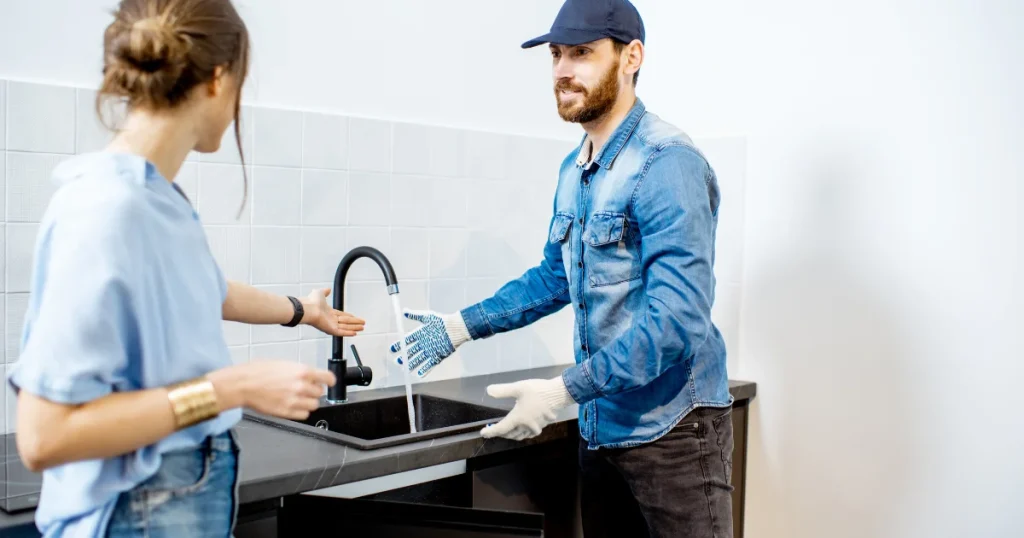
Step 1: Identify the Source of the Odor
Pinpointing where the smell originates helps you choose the right cleaning approach.
How to Inspect:
- Sink Basin: Check for grime or food residue around the edges and corners.
- Drain and Disposal: Run water down the drain and sniff for odors.
- Under the Sink: Inspect for leaks or mold in the cabinet below.
Once you’ve identified the source, you can move on to targeted cleaning.
Step 2: Clean the Sink Basin Thoroughly
A clean sink basin is the foundation of a fresh-smelling kitchen.
Cleaning Steps:
- Use dish soap and a sponge to scrub the sink basin.
- Pay special attention to corners and the area around the faucet.
- Rinse with warm water and dry with a microfiber cloth to prevent water spots.
This step removes surface grime and eliminates mild odors.
Step 3: Clear the Drain with Baking Soda and Vinegar
Baking soda and vinegar are a powerful natural duo for breaking down odors.
How to Use:
- Pour 1/2 cup of baking soda down the drain.
- Follow with 1 cup of white vinegar.
- Let the mixture fizz for 10–15 minutes.
- Flush with boiling water to clear the drain.
This method is effective for most mild clogs and organic buildup.
Step 4: Sanitize the Garbage Disposal
Garbage disposals are often the main source of kitchen sink odors.
How to Clean the Disposal:
- Turn off the disposal and remove any visible debris.
- Add ice cubes and a handful of salt, then run the disposal with cold water to clean the blades.
- For extra freshness, grind citrus peels (lemon or orange).
This approach deodorizes and sharpens the disposal blades.
Step 5: Flush the Drain with Boiling Water
Hot water helps dissolve grease and flush out debris.
How to Flush:
- Boil a kettle of water.
- Slowly pour the hot water down the drain in stages.
- Repeat if necessary to clear stubborn grease.
Regular hot water flushes can prevent future buildup.
Step 6: Use Enzymatic Cleaners for Persistent Smells
Enzymatic cleaners break down organic material that causes odors.
How to Use:
- Follow the product instructions to pour the cleaner into the drain.
- Allow it to sit for the recommended time (often overnight).
- Flush with warm water to rinse away the residue.
These cleaners are eco-friendly and safe for most plumbing systems.
Step 7: Check and Clean the P-Trap
The P-trap is a curved pipe under your sink that can trap debris and odors.
How to Clean the P-Trap:
- Place a bucket under the P-trap to catch water.
- Unscrew the pipe and empty its contents.
- Clean the pipe with hot water and soap before reattaching it.
This step is essential for addressing persistent smells.
Step 8: Address Mold and Mildew Issues
Mold and mildew thrive in damp environments, contributing to odors.
How to Eliminate Mold:
- Spray a bleach solution (1 part bleach to 10 parts water) on affected areas.
- Let it sit for 10 minutes before scrubbing.
- Rinse with warm water and dry thoroughly.
For a natural alternative, use white vinegar or hydrogen peroxide.
Step 9: Deodorize with Essential Oils
Essential oils add a pleasant scent while deterring pests.
How to Use Oils:
- Add a few drops of peppermint or lemon oil to your drain after cleaning.
- Combine oils with baking soda for a fragrant deodorizing paste.
This final touch leaves your sink smelling fresh and inviting.
Preventing Future Kitchen Sink Odors
Prevention is key to maintaining a fresh-smelling sink.
Tips:
- Avoid Pouring Grease Down the Drain: Dispose of grease and oil in a separate container instead.
- Use a Drain Strainer: Catch food particles to prevent them from going down the drain.
- Flush the Drain Regularly: Pour boiling water weekly to keep pipes clean.
- Keep the Garbage Disposal Clean: Run the disposal with water and citrus peels weekly for freshness.
- Inspect Pipes Periodically: Check for leaks, blockages, or buildup in the plumbing.
Consistent maintenance minimizes the risk of future odors.
Dealing with Specific Odor Problems
Different smells require tailored solutions:
- Sulfur Smells (Rotten Eggs): Likely caused by bacteria in the drain. Use baking soda and vinegar or enzymatic cleaners.
- Stale Water Odors: Clean the P-trap and ensure proper drainage.
- Chemical Smells: Check for recent use of strong cleaners and flush with water to neutralize residues.
Understanding the source helps you choose the right remedy.
Natural vs. Chemical Cleaning Solutions
Both natural and chemical cleaners have their place:
Natural Remedies:
- Eco-friendly and safe for daily use.
- Effective for mild odors and regular maintenance.
Chemical Cleaners:
- Best for severe clogs or stubborn smells.
- Should be used sparingly and with caution.
When to Call a Plumber
Sometimes, odors persist despite your best efforts.
When to Seek Help:
- Smells return immediately after cleaning.
- There are signs of a deeper plumbing issue, such as slow draining or water backup.
- You notice leaks or damage under the sink.
A professional plumber can address complex problems effectively.
DIY vs. Professional Odor Removal
Here’s a quick comparison:
| Aspect | DIY Approach | Professional Help |
|---|---|---|
| Cost | Low (basic tools and cleaners). | Higher, depending on the issue. |
| Effectiveness | Works for minor odors and maintenance. | Essential for major or recurring issues. |
| Time Required | 1–2 hours for most tasks. | 4–8 hours, depending on the problem. |
Common Mistakes to Avoid
Avoid these errors to ensure a fresh-smelling sink:
- Ignoring the Drain: Many odors originate from buildup inside the pipes.
- Overusing Harsh Chemicals: Excessive use can damage pipes and worsen smells.
- Delaying Cleaning: Letting grime accumulate makes odors harder to eliminate.
Conclusion
Getting rid of bad kitchen sink smells involves a combination of deep cleaning, regular maintenance, and preventive measures. By following these steps and adopting good sink hygiene practices, you can eliminate odors permanently and keep your kitchen fresh and inviting.
FAQs
Why does my kitchen sink smell bad?
Bad smells are often caused by food residue, bacteria, or clogged drains.
Can baking soda and vinegar eliminate all odors?
This natural remedy is effective for most mild smells but may not resolve severe clogs.
How often should I clean my sink to prevent smells?
Clean the sink daily and deep clean the drain weekly for best results.
What’s the best way to clean a garbage disposal?
Use ice cubes and salt to clean the blades, followed by citrus peels for freshness.
Should I pour bleach down the drain for odors?
Bleach can kill bacteria but should be used sparingly to avoid pipe damage.
What if the smell comes back after cleaning?
Persistent smells may indicate a plumbing issue, requiring professional attention.
Check this video: Get Rid of Bad Odors from Kitchen Sink in 11 Minutes for clean your sink perfectly.
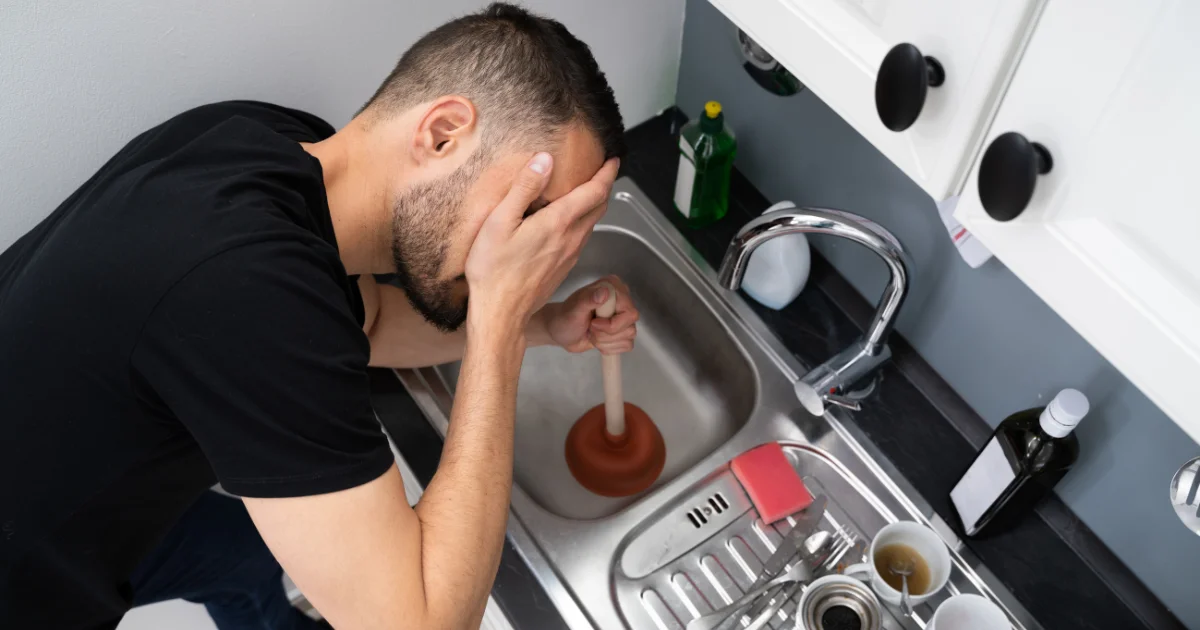
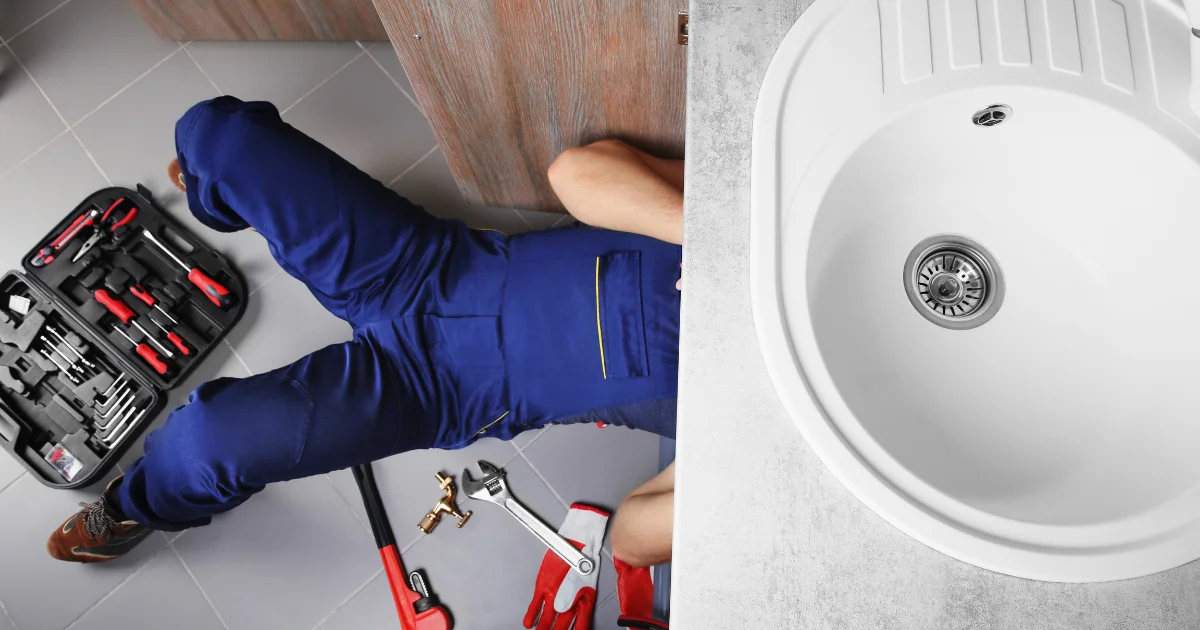
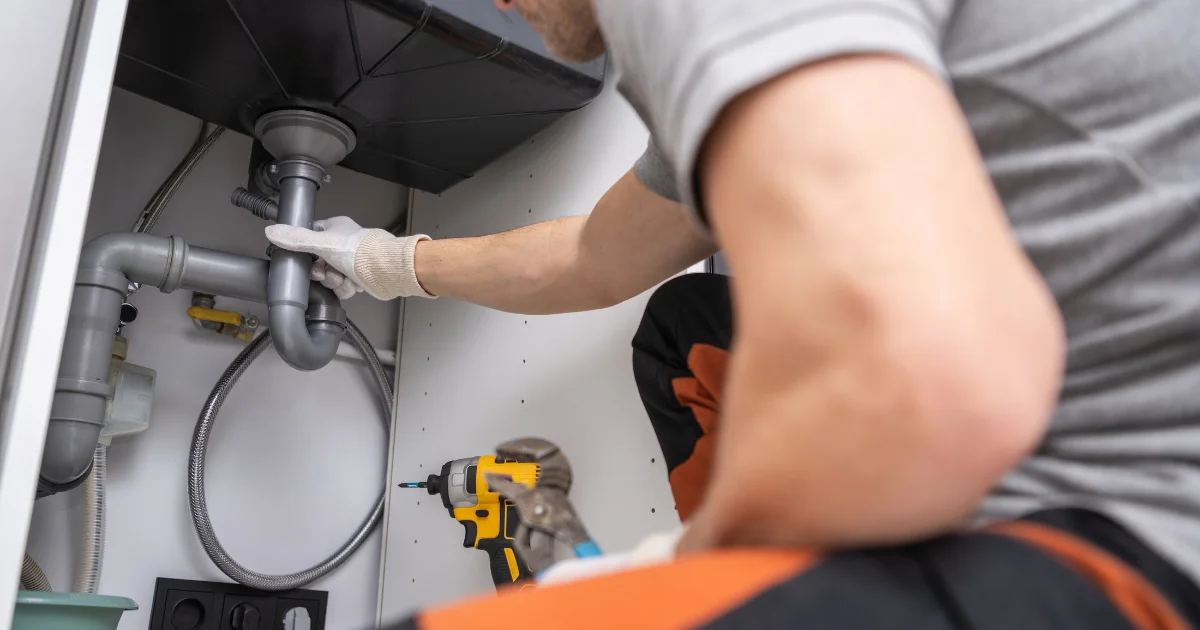

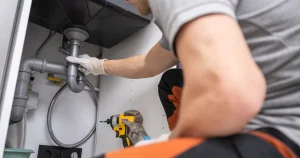
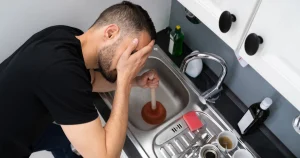


Post Comment